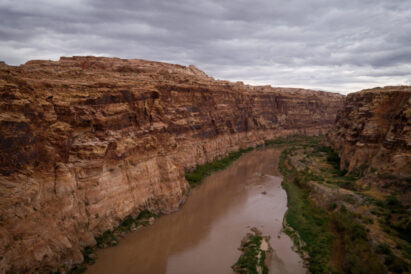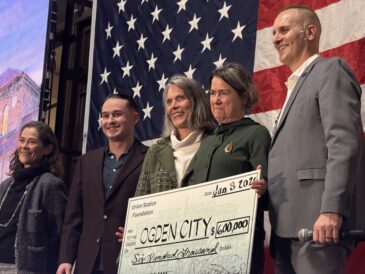NASA astronauts at International Space Station answer questions from local students
- STAR Camp attendees look on as astronauts Jonny Kim and Takuya Onishi answer their questions during an event at the Utah Military Academy campus in Riverdale on Friday, June 27, 2025.
- STAR Camp attendees look on as astronauts Jonny Kim and Takuya Onishi answer their questions during an event at the Utah Military Academy campus in Riverdale on Friday, June 27, 2025.
- STAR Camp attendees participate in STEM activities during an event at the Utah Military Academy campus in Riverdale on Friday, June 27, 2025.
- STAR Camp attendees participate in STEM activities during an event at the Utah Military Academy campus in Riverdale on Friday, June 27, 2025.
RIVERDALE — Participants in the Douglas Space and Science Foundation’s latest STAR Camp filled the gymnasium at the Utah Military Academy in Riverdale on Friday morning. Despite the crowd, a pin drop could be heard as the youths were greeted by astronauts Jonny Kim and Takuya Onishi via a NASA live feed.
Kim and Onishi are flight engineers living and working on the International Space Station, or ISS, as part of Expedition 73. During the Earth-to-space call, the pair answered pre-recorded questions from campers past and present.
According to the camp’s assistant director, Sarah Merrill, the rare opportunity to hear directly from astronauts was several months in the making.
“We had to submit a proposal to the Downlink Education Office (at NASA) to be selected,” Merrill said. “We started it actually last September — submitted our proposal in October. … In late March, they said ‘You’ve been selected.'”
Merrill said students reacted with excitement upon learning that they would be able to ask questions of astronauts. It was exciting for her and Douglas Space and Science Foundation Executive Director Annika Jensen, too — themselves former attendees of Astro Camp, the parent program of STAR Camp.
“I came to this program as a 15-year-old kid, worked here as staff as a teenager and I’m back as an adult. My kids come here. It’s a place we know we belong to,” Merrill said. “I grew up thinking I was going to be an astronaut. Life did different things, but I am a mechanical/aerospace engineer. … I love being back at STAR Camp and being a part of the program.”
During Friday’s event, the astronauts fielded an array of questions, which included inquiries about what kind of research is currently being done at the ISS, how those onboard spend their downtime and whether swallowing/eating is difficult in zero gravity (it is, but the body adapts eventually).
Onishi noted that one of the biggest misunderstandings people have about space is just how close the ISS actually is. The station is orbiting the earth at an altitude of just 400 kilometers, or 260 miles. In a similar vein, Jensen told the Standard-Examiner that reinforcing the idea that students’ dreams are within their reach is an important aspect of the camps.
“They talked about the distance from Earth, and what I have found as an educator and as an aerospace engineer myself is that there’s a big misunderstanding about who can work in space,” Jensen said. “We need lawyers, we need business people, we need artists, we need everybody — not just the astronauts. So, that’s kind of the picture we’re trying to paint for the public and for kids especially.”
STAR stands for science, technology, achievement and research, so the camps are rooted in bringing STEM experiences to students and families of all ages. However, Jensen and Merrill say that instilling confidence and a sense of belonging is also part of the mission.
Ashly Hunter — whose daughter, Mila, stumped the astronauts with a question about wristwatches in space — praised the hands-on nature of the camp experience.
“If you look around the room that we’re in right now, you can see kids over here exploring with one thing and kids over there exploring with another thing and they’re just playing, but they’re being led in a way where they’re really increasing their understanding of science and dynamics and how they all work together,” Hunter said.
For more information about STAR Camps, go to https://www.douglassciencecenter.org/.











